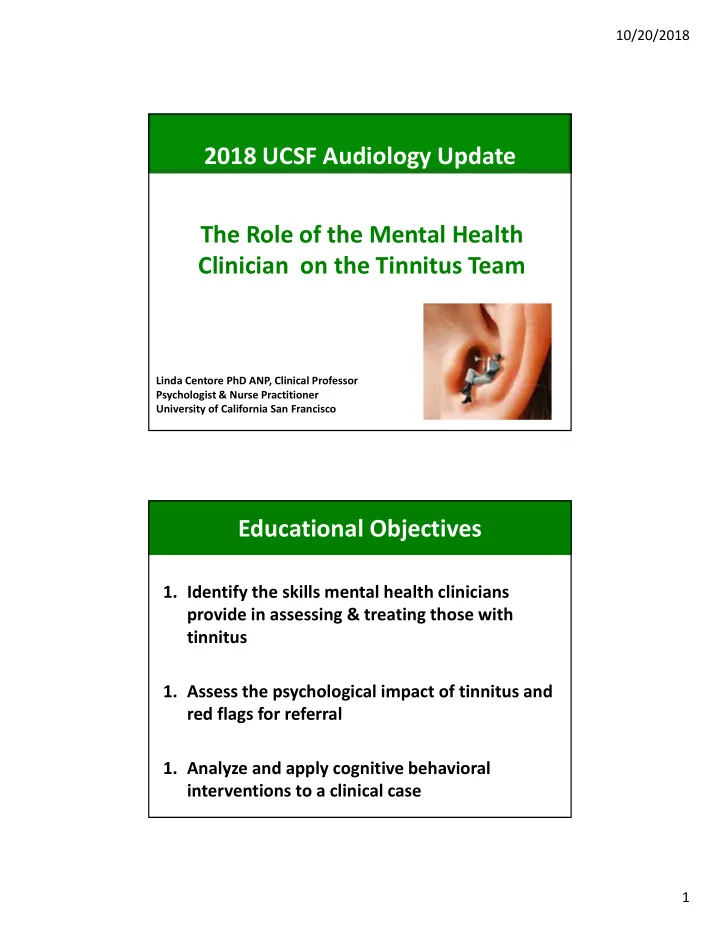

10/20/2018 2018 UCSF Audiology Update The Role of the Mental Health Clinician on the Tinnitus Team Linda Centore PhD ANP, Clinical Professor Psychologist & Nurse Practitioner University of California San Francisco Educational Objectives 1. Identify the skills mental health clinicians provide in assessing & treating those with tinnitus 1. Assess the psychological impact of tinnitus and red flags for referral 1. Analyze and apply cognitive behavioral interventions to a clinical case 1
10/20/2018 Health Care Professional Skills • Communicate effectively • Set realistic expectations • Assess patient’s ability to adapt • Monitor patient’s ability to cope • Don’t take behavior personally • Know your limits • Ask for help Emotional Requirements of Audiologist Tolerate Expression of Strong Emotion Have Compassion / Retain Objectivity Be Responsive / Have Boundaries 2
10/20/2018 Pandora’s Box Emotional Requirements of Patients Move from Denial to Acceptance Form a Good Faith Relationship Be Willing to Use New Tools 3
10/20/2018 Barriers to Adapting to Tinnitus Intolerant Grief of Treasures of Health loss of Silence Problems Perfect Health Narrow Window of Easily Comfort Irritable Searching Cognitive Paralyzing for Cause Distortions Doubt or Cure Evaluation of Tinnitus By Audiologist How is the patient Impact on quality Able to sleep and managing? of life? concentrate? Use cognitive If overwhelmed or behavioral in crisis strategies Refer to Mental Health 4
10/20/2018 Red Flags for Mental Health Referral • Loss of interest or pleasure in all activities • Withdrawal from family / friends • Increased alcohol or substance use • Difficulty getting to / staying asleep • Panic attacks or near panic • Despair / depression daily or almost daily • Overwhelmed /Frequent Crying / in Crisis • Suicidal statements /Cry for help Mental Health Clinician Skills • Assess impact of new or worsening physical symptom on ability to function • Work with grief due to loss of perfect health & impact on current responsibilities • Work collaboratively on the emotional impact and acceptance of TX plan recommendations 5
10/20/2018 Which of the following is most harmful to the patient? a) Not spending enough time with a patient b) Not giving the patient enough strategies on how to cope c) Telling a patient there’s nothing we can do for you Iatrogenic Despair a) Telling a patient not to worry Which must be present for a successful doctor ‐ patient relationship? a ) a willingness to change & adapt b) a persistence to be heard & understood c) a participatory decision ‐ making style d) an ability to trust the clinician Good Faith Relationship 6
10/20/2018 Challenging Behavior 7
10/20/2018 8
10/20/2018 Audience Activity • What are the positive aspects in working with individuals with tinnitus? • What are the challenges in working with individuals with tinnitus? Take about 10 minutes to discuss 9
10/20/2018 The Fourth Quadruple Aim Quadruple Aim Triple Aim -Institute for Healthcare Improvement 2008 Quadruple Aim - Michigan Institute for HealthCare Improvement (MiHIA) 2016 Self ‐ Care for the Audiologist 10
10/20/2018 Lack of Self ‐ Care Consequences COMPASSION BURN OUT FATIGUE NEGATIVE CAREER EMOTIONAL DISSATISFACTION REACTION TO PATIENT Clinical Case 11
10/20/2018 Setting and Context • In your clinic, the person who sees tinnitus patients is out so patients with tinnitus have been added to all schedules. • You’ve already had a hard week & you’re not looking forward to this. • And, it’s a few weeks until your vacation which you really feel like you need right now Clinical Case • 67 year old male with a 3 month exacerbation of pre ‐ existing tinnitus. He reports 9/10 loudness tinnitus that sounds like “eeeeee.” Associated features: sound sensitivity. “I have trouble sleeping and can’t concentrate to read….I had to take time off work.” He confides it’s causing some marital problems because he is curt and snaps at his spouse. He states: “You have to do something. There’s got to be a way to make go back down to being mild or I can’t function!” • Exam findings: Symmetrical, mild sensorineural hearing loss at 6000 – 8000 Hz bilaterally. Normal tympanograms bilaterally. 12
10/20/2018 Self ‐ Reflection Or Understanding the Mylanta Moment Audience Activity 1. What is most challenging aspect about this for you? 2. Does anything concern you about this patient? 3. What counseling advice would you provide? 13
10/20/2018 Management of Tinnitus Non ‐ Pharmacologic Interventions Continuous Preferred Provide Hope Sleep Sound Stress Habituation Management Behavioral Tools • Restorative Sleep • Soothing Preferred Sound “There is something in between never and • Engage in Activities forever…” • Avoid Monitoring • Avoid the Internet Chat Rooms • Cognitive Behavioral Therapy • Mindfulness Meditation • Medical Therapy/Pharmacology 14
10/20/2018 Cognitive Distortions • All or nothing thinking • Overgeneralization • Disqualifying the positive • Jumping to conclusions • Catastrophizing • Emotional reasoning • Labeling or mislabeling • Personalization • Fallacy of Fairness • Control fallacy Last Audience Question Which cognitive distortion is represented by the statement: “If the tinnitus is bad now, it’s just going to get worse and worse!” a) Catastrophic thinking b) Disqualifying the positive c) Fallacy of fairness d) All or nothing thinking What would you say in response to this patient reaction? 15
10/20/2018 Thank you for your attention 16
10/20/2018 Additional Resources 1. National Guideline Clearing House. Agency for Health Care Research and Quality Guidelines (AHRQ) at www.guideline.gov for management of anxiety, depression, insomnia. 2. Vandekieft, GK (2001). Breaking bad news. American Family Physician. December 64 (12); 1975 ‐ 78. Located at http://www.aafp.org/afp/2001/1215/p1975.pdf 3. Compassion Fatigue in Health Care Providers Awareness Project at http://www.compassionfatigue.org/index.html 4. Pomm HA, Shahady E, and Pomm RM. (2004) The CALMER Approach: Teaching Learners Six Steps to Serenity When Dealing With Difficult Patients. Family Medicine 36 (7); 467 ‐ 69. Located at http://www.stfm.org/fmhub/fm2004/July/Heidi467.pdf 17
Recommend
More recommend